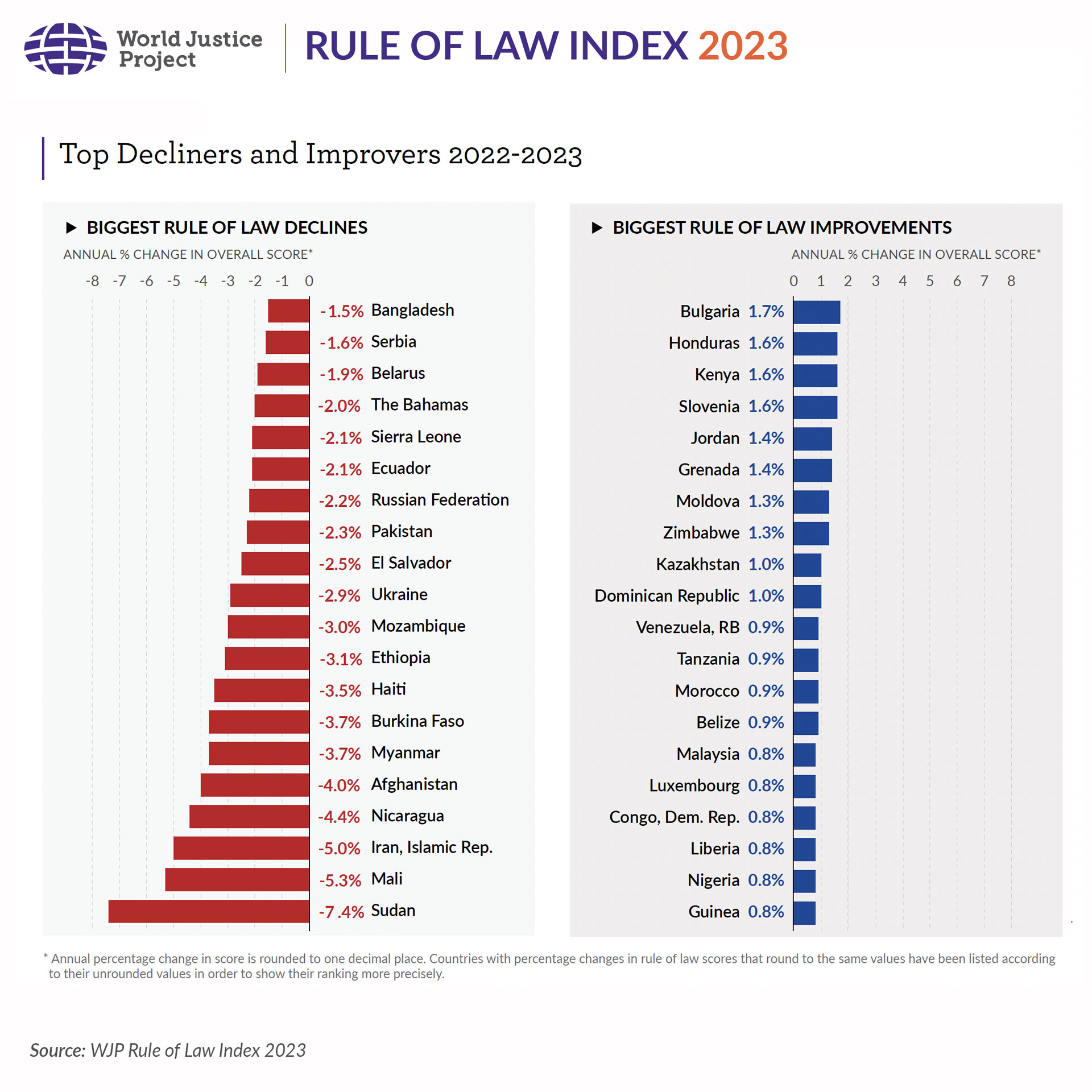Omanyano ovanhu koikundaneki yomalungula kashili paveta, Commisiner Sakaria takunghilile
Veronika Haulenga
Omanyano ovanhu koikundaneki yomalungula kashili paveta, Commisiner Sakaria takunghilile
Veronika Haulenga
Listeners:
Top listeners:
-
play_arrow
Omanyano ovanhu koikundaneki yomalungula kashili paveta, Commisiner Sakaria takunghilile Veronika Haulenga
Human Rights Declined in 3 out of 4 Countries since a Global Rule of Law Recession Began in 2016

The rule of law has once again eroded in a majority of countries this year, according to the World Justice Project (WJP) Rule of Law Index 2023. More than 6 billion people live in a country where the rule of law weakened between 2022 and 2023.
Since authoritarian trends pushed the world into a rule of law recession in 2016, the global downturn has affected 78% of countries, the latest Index shows.
The rule of law factor to decline most between 2016 and 2023 is Fundamental Rights—down in 77% of countries.
This and other authoritarian trends continued in 2023, but they are slowing, with fewer countries declining in 2022 and 2023 than in earlier years. On the other hand, declines in the functioning of justice systems are now spreading, with more countries struggling to provide people with timely, affordable, and accessible justice. The Index factor measuring Civil Justice was the factor that declined in the most countries this year.
“The world remains gripped by a rule of law recession characterized by executive overreach, curtailing of human rights, and justice systems that are failing to meet people’s needs,” said WJP co-founder and president William H. Neukom. “People around the world are paying the price.”
The WJP Rule of Law Index is the world’s leading source of original, independent rule of law data. Its rigorous methodology draws on expert and household surveys to measure rule of law in 142 countries and jurisdictions, covering 95% of the world’s population.
Each country’s score is an average of eight factors: Constraints on Government Powers, Absence of Corruption, Open Government, Fundamental Rights, Order and Security, Regulatory Enforcement, Civil Justice, and Criminal Justice.
Authoritarian trends slow
Spurred by rising authoritarianism in 2016, the current global rule of law recession worsened at the height of the Covid pandemic when governments shuttered justice systems and restricted civic freedoms.
Over the past seven years, Index scores for Constraints on Government Powers have fallen in 74% of countries. Around the world, checks on executive power from legislatures, judiciaries, and civil society—including the media—have all weakened, the Index shows.
While this authoritarian trend persisted in every region of the world in 2023, it has slowed for the second year in a row. Constraints on Government Powers fell in 56% of countries this year, compared to 58% in 2022 and 70% in 2021. Likewise, a smaller majority of countries saw overall rule of law declines in this year (59%) as compared to the last two (61% and 74%).
Rights protections falling as Universal Declaration of Human Rights turns 75
The WJP Rule of Law Index evaluates the status of many of the human rights enumerated in the Universal Declaration of Human Rights. These include four out of five indicators that have declined the most during the global rule of law recession.
Since 2016, civic participation has fallen in more countries than any other Index subfactor (83%), followed by freedom of assembly and association (81%), freedom of opinion and expression (78%), and freedom of religion (76%).
“It’s a sobering picture to contemplate as the world marks the 75th anniversary of the Universal Declaration of Human Rights later this year,” WJP Executive Director Elizabeth Andersen said.
While a majority of countries (56%) experienced a decline in Fundamental Rights again this year, the proportion is lower than in 2022 (66%).
Justice system failures expand
Negative justice trends expanded in 2023. Two-thirds of countries (66%) saw their Index scores for Civil Justice fall this year, up from 61% of countries last year. Greater justice delays and weaker enforcement are largely to blame. Meanwhile, scores for Criminal Justice also fell in slightly more countries this year (56%) than last year (55%).
“Our previous research estimates that 1.5 billion people are unable to solve their legal problems,” Andersen said, “so it is particularly alarming that so many justice systems got even weaker in 2023. If we are to reverse course, justice systems need a paradigm shift to a people-centered approach, putting the needs of the people they are intended to serve first,” Andersen added.
Rankings revealed. Some countries defy global negative trends.
The top-ranked country in the 2023 WJP Rule of Law Index is Denmark, followed by Norway (2), Finland (3), Sweden (4), and Germany (5). The bottom ranked countries are Venezuela (142), Cambodia (141), Afghanistan (140), Haiti (139), and the Democratic Republic of the Congo (138).
Two countries were added to the Index this year. Kuwait ranks 52 out of 142 globally and 2nd in the Middle East and North Africa region, while Montenegro comes in at 57 globally, and 2nd in Eastern Europe and Central Asia.
The countries with the biggest rule of law declines in the past year are Sudan, Mali, Iran, Nicaragua, and Afghanistan, while the countries that improved their rule of law score most 2022-2023 are Bulgaria, Honduras, Kenya, Slovenia, and Jordan. Honduras was also a top improver last year.
In the longer term, the countries to buck global trends and strengthen the rule of law most since 2016 are Uzbekistan, Moldova, Zimbabwe, Kazakhstan, and Malaysia.
Explore the full rankings and findings of the 2023 World Justice Project (WJP) Rule of Law Index at: http://www.worldjusticeproject.org/index/
Written by: Staff Writer
Authoritarianism Civil Society Government human rights media rights Rule of Law Universal Declaration of Human Rights William H. Neukom WJP WJP Rule of Law Index World Justice Project
Similar posts
Windhoek Weather
Most popular

Mbumba signs off new benefits for retired political office bearers

Former FNB employee arrested after defraud pensioner off N$215, 000

Namdia Heist: More questions, lots of confusion

Omuhwahwameki Michael okuunganeka oshikonga shoku patitha oostola dho Rani moshilongo ashihe.

Windhoek woman loses N$60,000 to fraudsters
Copyright 2025 Future Media (Pty) Ltd | Website by Digital Platforms
Tel: +264 83 000 1000 | Email: news@futuremedia.com.na





